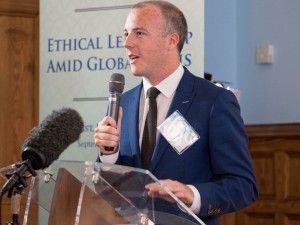Opinion: A ‘Brexit Convention’ for Northern Ireland
We are committed to partnership, equality and mutual respect as the basis of relationships within Northern Ireland, between North and South, and between these islands.”
Preamble to the Belfast Good Friday Agreement 1998
There is one certainty that is clear in the opening weeks of 2017: we are in uncertain times. Much of the current commentary and discourse is about the RHI scandal, who was responsible, who was to blame. There are serious issues and questions unresolved and in whatever talks process that will emerge, a lot of focus will be on getting answers.
Politicians are elected to represent their community and fulfil their electoral mandate. This must be respected and it will be for the politicians to negotiate and decide how best to create the next talks process.
As Einstein observed “insanity is doing the same thing over and over again and expecting the same results”. Therefore, a central focus of these talks must include relationship building. This requires providing space to politicians and support to find new ways of communicating and relating to each other. Without this, the Assembly and Executive will fail to function and lack of trust will make negotiations and delivering for citizens practically impossible.
It is also a time for our society, and each of us individually, not to react but to proactively think about how we all work together to solve the challenges that affect us all.
In a matter of weeks, the UK Prime Minister will trigger Article 50 of the Lisbon Treaty and the Brexit negotiations will begin. The timetable of an NI Assembly election/ talks process will have no bearing on this.
A serious problem arises: Northern Ireland has no Brexit plan. Not only do we not have a plan, it is likely that we may not have a government to advocate on our behalf. The political talks between the NI parties will be about saving the institutions, not about how to establish the best outcome for Northern Ireland in the upcoming Brexit negotiations. The implications of Brexit are some of the most important policy and constitutional issues Northern Ireland has to face.
We need a space for informed thinking, debate and solutions to ensure the best outcome for all the people of Northern Ireland in the Brexit negotiations.
So what can be practically done against the backdrop of the current political crisis?
I propose that a “Brexit Convention” is immediately established. This Convention would be a ‘collective’ of key influencers from across business, civic, community, voluntary, trade union, student, agriculture, media and many others. This group should be as widely representative of society in NI as possible and include new voices, emerging leaders and the most marginalised in our community.
The Convention would represent a genuine collaborative relationship between the public, private and community sectors and provide expertise and assistance during this time of crisis.
It would be tasked to “establish recommendations to achieve the best outcome for NI in the upcoming Brexit negotiations”. It could have support of British & Irish Governments and report to the NI political parties.
Part of this process could involve hosting “Town Hall” style meetings which allow the public to engage with ideas and be part of the process. This will lead to creative thinking, innovative perspectives, expertise, transparency and accountability.
 This format could provide a model that might be used to assist with the political negotiations and to examine other issues in the future, for example around mental health or an ambitious economic plan, etc.
This format could provide a model that might be used to assist with the political negotiations and to examine other issues in the future, for example around mental health or an ambitious economic plan, etc.
In the longer term, consideration should be given to establishing a think tank with local, national and international expertise to develop innovative policy and strategic thinking. Northern Ireland needs to connect to a much bigger global reality.
It is a time for us to collectively step up to the challenges we face. This proposal won’t resolve everything, but if we utilise the best of our abilities, our creative spirit, call upon our resilience and summon our courage, we can start to find solutions in a meaningful way. This will inspire us to continue on our journey to grow a united community and build a prosperous, peaceful future for all.”
Conor Houston, Programme Director, CDPB



